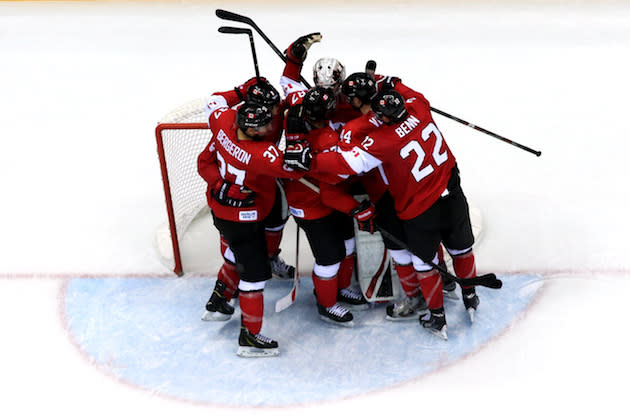5 things we learned from Canada’s win over the U.S.
Canada defeated the U.S. 1-0 to move on to Sunday's gold medal game versus Sweden. Here are five things we learned:
• Forecheck? What forecheck? The pressure in the Canadian zone was almost non-existent. The cycling that made the U.S. line of Max Pacioretty, Paul Stastny and T.J. Oshie so effective early in the tournament was held in check by Canada. The U.S. couldn't sustain any pressure in the offensive zone to create chances. "Every time they got the puck in their own end they were getting it out," said Patrick Kane.
• Canadian defenders the story again. Why did the American forecheck look so slow? Because the Canadian blueliners are so quick in transition. Duncan Keith, Drew Doughty, Shea Weber, and the like are among the best in the world at turning the play up ice, and it showed, provided you were watching closely. It happened a lot, but each time, it was in an instant. Much has been made about the horses the Canadians have up front, but as is often the story in hockey, the blue line has been the real engine. They were the difference in this game, as they have been in every game so far.
• Carey Price didn't need to work. The Americans entered Friday's semifinal game as with the most goals in the tournament. Yet, Canada kept the U.S. opportunities limited to the outside, denied them any sort of net front presence and didn't allow any rebound chances that could have led to goals. The power play setup (0-for-3) also failed to create any good scoring chances.
• No Crosby, no problem. Once again, Sidney Crosby had chances, but he didn't score. Going into this game, most felt that if he didn't produce, Canada wouldn't punch their way through to the gold medal match. Fortunately, that wasn't the case. Canada has a lot of weapons. The hero this time around was Jamie Benn, who tipped a point shot from Jay Bouwmeester past Quick.
• Bring on the Swedes. A win over Sweden would make Canada the first country to win back-to-back gold medals for the first time since the Soviet Union in 1984 and 1988. It's also been 72 years since Canada has won gold on European soil.
With files from Harrison Mooney

 Yahoo Sports
Yahoo Sports 


